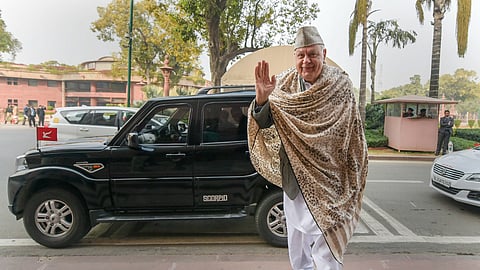

The Chief Minister and the Spy by AS Dulat kicked up a storm even before its release after the ex-RAW chief's 'revelations' about former Chief Minister Farooq Abdullah's private stance on the abrogation of Article 370. In this excerpt from Chapter 6 'Power Plays and Betrayals', Dulat talks of how Farooq Abdullah's hopes of becoming India's vice president ended up being dashed:
This was a time when Omar could yet not stand up to his father. On one occasion, just prior to the elections in 2002, Doctor Sahib wanted to introduce Omar to P.S. Gill, his favourite candidate as the next prospective DG. Omar was neither comfortable with the idea of meeting Gill, nor with having Gill thrust upon him as DGP. He wanted me to be present. It was an occasion where I felt for Omar. Much as I liked Gill myself, I felt it was premature to thrust a DGP upon Omar even before he became chief minister.
Farooq’s plan was that Omar would be a minister in his government for a year or two, as an apprentice of sorts, and then take over as chief minister for the rest of the term, at which point Farooq would withdraw. ‘Let him learn,’ he said.
In a sense, he was hedging his bets, because it was now dawning on him that Delhi intended to make Omar chief minister, but it would never make him vice-president of India.
Brajesh (Mishra, Atal Bihari Vajpayee's all-powerful Principal Secretary), on the other hand, was very clear about going ahead with the switch to get Farooq out of Kashmir. So when participation in the elections grew beyond expectations, he asked me: ‘Omar is all right, no?’ What worried Brajesh was that even people on the fringe of the Jamaat were jumping into the elections. Anything could happen.
The thing was that all these fellows had a reservation at the back of their minds, that the elections would be fixed, that the NC would return no matter what they did. It was in order to allay that fear and extract greater participation through transparently free and fair elections that the Vajpayee government made a suggestion to Farooq. It came up during the time that Farooq was promised the vice-presidency. In those days, Brajesh and Farooq talked openly and freely because Farooq was going to be vice-president.
‘Doctor Sahib,’ Brajesh said. ‘Aisa hai, this time we want the elections to be free and fair. Omar toh chief minister banega hi, but we want the elections to be free and fair, so we would like to have it under Governor’s Rule.’ (Omar will definitely be chief minister.)
Luckily, he’d caught Farooq in a good mood. Farooq’s amiable response was, ‘Theek hai, laga dena uss time. [All right, put Governor’s Rule in place at that time.] If we are on the same page and I know where we are headed, then okay.’
For that brief moment, perhaps, Farooq believed that he might actually be made vice-president of India.
But it was an illusion.
Around May that year, the whispers began in Delhi. That month, I was in Srinagar and received a message that the chief minister wanted to meet me at 11 in the morning. I took it for granted that I had been called home, but I was told, ‘No, sahib ne office bulaya hai,’ which is very unlike Farooq.
At his office, he sat me across the desk and asked me point-blank, ‘What are Delhi’s plans? Do you believe that these guys will make me vice-president?’
‘Why not?’ I asked.
‘I don’t believe it, that’s why I’m asking you.’
‘What do you believe?’ I asked. ‘Sir, you’ve spoken to the home minister about this, haven’t you?’
Farooq said yes.
‘And you’ve spoken to the prime minister about this?’
‘Yes.’
‘If both have given you their word then you will be the next vice-president,’ I said.
‘But I don’t trust them,’ Farooq said. ‘I don’t trust Delhi.’
As it turned out, he was right.
There are always wheels within wheels, not the least being that the Rashtriya Swayamsevak Sangh (RSS) was no fan of Farooq’s.
The facts are well-known: in 2002, Vice-President Krishan Kant was on course to become the 11th president of India.
Such a promotion to Rashtrapati Bhavan was a tradition, and in this way, six previous vice-presidents had gone on to become president. At the time, Vajpayee and Sonia Gandhi were both agreeable to Kant’s candidature – he was one of the Congress party’s original ‘Young Turks’ and a member of the 1977–80 Janata Party government. His name had been announced as such.
Several members of the NDA government, like Home Minister L.K. Advani, however, remembered that along with Madhu Limaye, Kant had been responsible for the fall of the Janata government over the issue of dual membership in the RSS.
So they opposed Kant.
Vajpayee then had to propose long-time civil servant and Tamil Nadu governor P.C. Alexander as the NDA’s candidate, but the Congress vetoed the idea. Ultimately, A.P.J. Abdul Kalam became president and proved to be the most popular one India has had. Two days after Kalam was sworn in, a broken-hearted Kant passed away, the only vice-president to die in office.
The moment Kalam was sworn in, Farooq’s fears were confirmed. The president and the vice-president of India could not both be from minority communities. He was proven right.
The result? Farooq had to be ditched. The NDA leadership had obviously said to Farooq whatever they had said, but they had not been sincere about what they had said. As before, betrayal came easily in politics. It didn’t matter to anyone that they had made certain promises which they were now breaking.
That was that.
(Excerpted with permission from Juggernaut Books.)